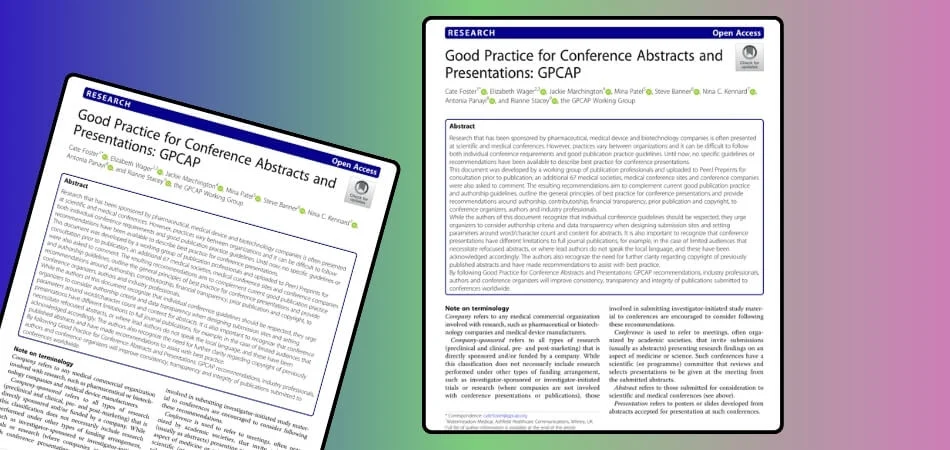Conferences serve as vibrant hubs of intellectual exchange, where minds converge to share cutting-edge research and innovative ideas. Within these dynamic gatherings, “conference abstracts” emerge as beacons of insight and knowledge. But, “What is a conference abstract?”
Simply put, conference abstract is a concise snapshot of a research paper, presentation, or poster. Think of it as a sneak peek into the academic world, where scholars encapsulate their main ideas, research methods, and key discoveries.
If you’re interested in exploring the cutting edge of knowledge, read on to discover how conference abstracts play a pivotal role in shaping the future of academia. Get ready to set out on a journey through the realm of intellectual discovery!
What Does the Abstract Signify?
An abstract serves as a concise summary, encapsulating the essence of a more extensive work, be it a research paper, report, or academic article. It offers a snapshot of the work’s key points, providing a quick reference for potential readers. This brief section is instrumental in helping readers determine the relevance of the work to their interests or research needs.
In academic and professional writing, the abstract functions as a crucial navigational tool. It briefly presents the main arguments, methodology, and findings of the work, guiding readers in their quest for specific information.
This compact overview not only saves time but also highlights the unique contributions of the work, enticing further exploration. For researchers and practitioners alike, a well-crafted abstract is a beacon, illuminating the path to deeper understanding and engagement with the content.
What is a Conference Abstract?
A conference abstract is a short summary that tells people about the topic of a research presentation. It helps experts understand the main ideas before deciding whether to attend the presentation or read the full paper. A strong abstract grabs attention and explains the research purpose, methods, and key findings clearly.
Many international conferences, including those in the United States, Europe, and a conference in Canada, require well-structured abstracts. Researchers must write in a way that interests reviewers while keeping the information short and useful. A good abstract follows strict guidelines and provides enough details to show the value of the research.
Writing an abstract takes planning because it must explain the research in a few sentences. Every word should help the reader understand the topic, goals, and results. A clear and engaging abstract increases the chances of being selected for a conference.
What are the Components of a Conference Abstract?
A conference abstract comprises several key components that convey the essence of a research presentation or paper. These elements ensure clarity and engage potential readers.
- Title: Choose a captivating title that succinctly conveys the main focus of your research and piques the reader’s interest.
- Introduction: In this section, briefly outline the context of your research, its relevance to the field, and the specific goals or questions you aimed to address.
- Methods: Detail the methodology you employed, outlining how data was collected, the sample size, data analysis techniques, and any unique or innovative approaches used.
- Results: Summarize the key findings of your research, highlighting the most significant outcomes and their potential impact on the field.
- Conclusion: Conclude by emphasizing the broader implications of your research, discussing its significance, and suggesting possible avenues for future exploration.
- Keywords: Include relevant keywords or phrases that help categorize your abstract, making it more discoverable in conference databases.
- References: If you’ve cited prior work in your abstract, provide the necessary references to acknowledge and support your research.
A well-structured conference abstract effectively communicates the essence of your research, enticing readers to delve into your full presentation or paper.
Different Types of Conference Abstracts You Can Write
Academic conferences provide a platform for researchers to share their work, and crafting the right type of conference abstract is crucial to effectively communicate findings. Engaging with your audience and connecting with fellow scholars can be enhanced by understanding these abstract types.
Research Abstracts
Research abstracts are comprehensive summaries of original studies. They typically include the research question, methodology, key findings, and their implications, offering a glimpse into the study’s significance and contributions.
Case Study Abstracts
Case study abstracts focus on specific instances or real-life examples. They highlight the unique context, the problem addressed, the applied solution, and the valuable insights or lessons derived from the case.
Literature Review Abstracts
Literature review abstracts condense existing research on a subject. They synthesize key findings, identify research trends, and pinpoint gaps in the literature, serving as a valuable resource for scholars seeking an overview of the topic’s scholarly landscape.
Poster Presentation Abstracts
Tailored for poster sessions, these abstracts succinctly describe the poster’s content. They outline the research objectives, and methods employed, and highlight the most compelling findings, piquing the curiosity of conference attendees.
Panel Discussion Abstracts
Panel discussion abstracts outline the session’s central theme, introduce the participating panelists and their expertise, and provide an overview of the main points or questions to be explored during the discussion, ensuring a cohesive and engaging panel presentation.
Workshop Abstracts

When researchers have a thorough understanding of the nuances of these conference abstract types, they can tailor their submissions effectively, ensuring that their presentations are aligned with the goals and format of academic conferences, and maximizing the impact of their presentations.
Step-By-Step Guide on How to Write a Conference Abstract
Before submitting your abstract, take the time to carefully review the conference guidelines and ensure that your submission aligns with the specified criteria. Crafting a proper conference abstract is paramount for effectively communicating the significance of your research and captivating an audience. Follow these detailed steps to craft an engaging and informative abstract:
Step 1. Define Your Research’s Key Message
Clearly articulate the central message of your research. Identify and prioritize the main objectives, research questions, or hypotheses that your study addresses. This forms the core of your abstract and helps you maintain clarity and focus throughout the writing process.
Step 2. Structure Your Abstract
Create a structured framework for your abstract, following the traditional format of an introduction, methodology, results, and conclusion. Allocate word count to each section based on its relative importance. This organization provides a logical flow and readability to your abstract.
Step 3. Write a Concise Introduction
In the introduction, briefly introduce the research topic, its relevance in the broader context, and the primary research question or objective you aim to address. Engage the reader by highlighting the significance of your study and providing essential background information.
Step 4. Summarize Your Methodology
Describe your research methods concisely, including details about data collection and analysis techniques. Emphasize the robustness of your approach and any unique aspects of your methodology that set your research apart. This section should reassure readers of your research’s credibility.
Step 5. Highlight Key Findings
Summarize the most significant and impactful findings or outcomes of your research. Focus on the data that directly support your main message and avoid overwhelming the reader with excessive details or technical jargon. Use clear and concise language to convey your results effectively.
Step 6. Conclude Effectively
Reiterate the broader implications of your research and its significance in the field. Discuss potential contributions, practical applications, or future research directions, leaving a lasting impression on the reader. Concluding with a strong, forward-looking statement can generate interest and enthusiasm for your work.
By following these steps, you can create a well-structured and compelling conference abstract that not only meets the conference’s requirements but also engages and informs your target audience effectively
Why Should You Write Conference Abstracts?
Writing conference abstracts is a valuable and integral aspect of the academic research process, offering a multitude of benefits that contribute significantly to academic growth and professional development.
Share Your Research
Conference abstracts provide a vital platform to disseminate your research findings to a diverse audience, transcending geographical and institutional boundaries. It allows you to communicate the essence of your work effectively. Furthermore, it’s an opportunity to showcase your expertise and present your research’s potential impact.
Contribute to Knowledge
Beyond disseminating information, your abstracts contribute to the collective knowledge of your field. Your insights, solutions, and perspectives may become building blocks for future research and practical applications. This contribution to the intellectual growth of your field is a cornerstone of academic progress.
Gain Recognition
The acceptance of your abstract at conferences amplifies your visibility and credibility within your academic or professional community. It signifies your commitment to advancing knowledge in your specialized domain. Additionally, presenting at renowned conferences can bolster your academic standing.
Receive Feedback
The peer review process inherent in abstract submission enables you to receive constructive feedback from experts. Such insights can be instrumental in refining your research, leading to more robust conclusions and methodologies. This feedback loop is a catalyst for academic growth and improvement.
Networking Opportunities
Conferences foster connections with peers, experts, and potential collaborators. Sharing your abstracts can spark meaningful conversations, offer opportunities for collaboration, and help you forge valuable professional relationships. Networking can open doors to collaborative research projects and career advancements.
Stay Current
The process of preparing abstracts necessitates keeping abreast of the latest developments and emerging trends in your field. This ongoing learning keeps you informed, sharpens your research focus, and bolsters your competitiveness. Staying current ensures that your work remains relevant and impactful.
Writing conference abstracts is more than just a formality. It helps you share knowledge, grow in your field, gain recognition, improve your work, connect with others, and stay updated. It benefits your career and the entire academic and professional community.
Bottom Line
Grasping the essence of “What is a conference abstract” is pivotal for researchers managing the academic landscape. These concise snapshots of research papers play a vital role in knowledge dissemination, professional recognition, and fostering valuable connections.
Crafting compelling conference abstracts isn’t a mere obligation but an opportunity to shine in the academic arena. It’s a pathway to share insights, gain visibility, and continuously enhance one’s expertise.
When we get into the world of conference abstracts, we enter a dynamic realm of intellectual exchange. As researchers get started on this endeavor, they pave the way for their contributions to shape the future of academia.







